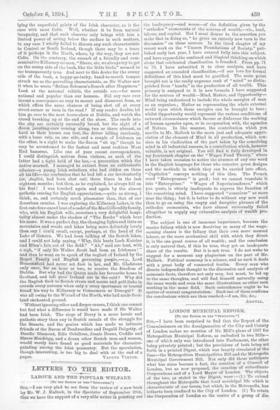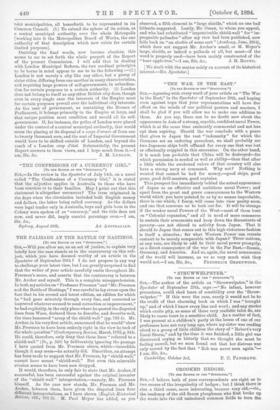LONDON MUNICIPAL REFORM.
[To THE EDITOR OF THE " SPECTLTOR."1 SIR,—I have been surprised to find that the Report of the Commissioners on the Amalgamation of the City and County of London makes no mention of Mr. Mill's plans of 1867 for Metropolitan Municipal Reform, as embodied in two Bills— one of which only was introduced into Parliament, the other being privately printed ; but the provisions of both being set forth in a printed Digest, which was largely circulated at the time—the Metropolitan Municipalities Bill and the Metropolis Municipal Government Bill. Not only did these anticipate what has since become a fact, the creation of a Council of London, but as now proposed, the creation of subordinate Corporations and of a Lord Mayor of London. The objects of the two, as stated in the Digest, were :—(1.) To extend throughout the Metropolis that local municipal life which is characteristic of our towns, but which, in the Metropolis, has hitherto been confined to the City of London. (2.) To retain the Corporation of London as the centre of a group of dig• bid, municipalities, all henceforth to be represented in its Common Council. (3.) To extend the sphere of its action, as a central municipal authority, over the whole Metropolis [working into it the Metropolitan Board of Works, the one authority of that description which now exists for certain limited purposes]. Omitting the final words, now become obsolete, this seems to me to set forth the whole purpoft of the Report of the present Commission. I will add that in dealing with London Municipal Reform, the two cardinal principles to be borne in mind appear to me to be the following :—(1.) London is not merely a city like any other, but a group of sister cities, differing from one another in many characteristics, and requiring large powers of self-government, in subordina- tion for certain purposes to a certain authority. (2) London does not belong to itself as any other British city does, though even in every single case the interests of the Empire must for certain purposes prevail over the individual city interests. As the seat of government, as containing the Houses of Parliament, it belongs primarily to the Empire at large, and that unique position must condition and mould all its self- government. If, for instance, the police of London were placed under the control of a central municipal authority, that would mean the placing at its disposal of a corps d'armee of from one to twenty thousand men, and the seat of Imperial Government would have to be shifted outside of London, and beyond the reach of a London coup d'itat. Substantially, the present Report answers to these views, and I hope much from it.—I







































 Previous page
Previous page